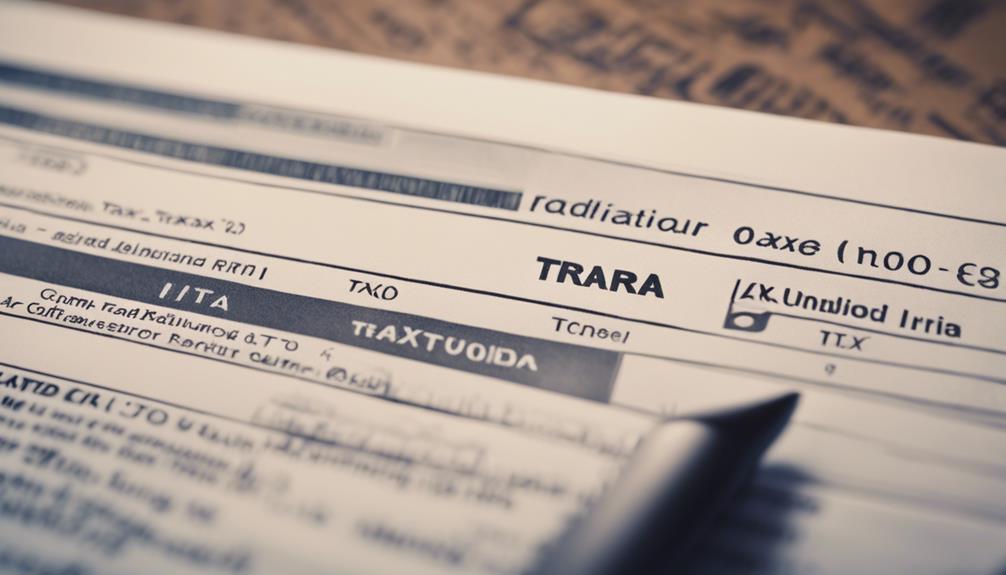Retirement plans can impact our tax return by influencing the amount we owe or receive from the government on an annual basis. Traditional IRAs might result in tax deductions, but taking out funds early could result in penalties. On the other hand, Roth IRAs allow for tax-free withdrawals during retirement and are advantageous for tax-conscious investors. Contributing to 401(k) plans decreases taxable income, but withdrawals are taxed as regular income. Pension plan withdrawals are subject to federal taxes, and early withdrawals may incur penalties from the IRS. It is crucial to understand these tax implications in order to manage retirement funds effectively. Additionally, it is important to consider the impact of pandemic relief on taxes as well.
Key Takeaways
- Traditional IRA contributions may lower taxable income.
- Roth IRA withdrawals in retirement are tax-free.
- 401(k) contributions reduce taxable income.
- Pension plan withdrawals are federally taxed.
- Retirement contribution tax credit incentivizes savings for lower-income individuals.
Traditional IRA Tax Implications
When contributing to a Traditional IRA, individuals may benefit from potential tax deductions that lower their taxable income for the year. These deductions can help reduce the amount of income subject to taxes, providing a valuable incentive for retirement planning.
However, it's important to take into account income limits and participation in employer plans, as these factors can affect the tax-deductible amount.
Early withdrawals from a traditional IRA before age 59½ may trigger a 10% IRS penalty on top of regular income taxes, underscoring the significance of strategic financial planning.
Additionally, once individuals reach age 72, they must start taking Required Minimum Distributions (RMDs) from their traditional IRA to avoid penalties.
Understanding these tax implications is vital for effectively managing retirement funds and avoiding unnecessary fees.
Roth IRA Tax Considerations

When moving to Roth IRA tax considerations, it's important to recognize that contributions to a Roth IRA differ from a Traditional IRA in that they aren't tax-deductible. This means that the money you put into a Roth IRA is made with after-tax dollars.
The key benefit of a Roth IRA comes during retirement when qualified withdrawals are tax-free, offering significant tax benefits down the road. Eligibility for a Roth IRA is based on income level, providing a tax-free growth and withdrawal option for those who meet the criteria.
With a Roth IRA, you pay taxes upfront on contributions, setting the stage for potential tax-free withdrawals in the future. This unique structure allows for tax-free growth on investments and tax-free withdrawals during retirement, making it a valuable tool for tax-conscious investors.
401(k) Tax Effects
Contributions to a traditional 401(k) have a direct impact on reducing taxable income for the current year. This means that the money you contribute to your traditional 401(k) isn't included in your taxable income, lowering the amount of income subject to taxes. It's like giving your future self a tax break while saving for retirement.
When you withdraw from your traditional 401(k) during retirement, the withdrawals are then taxed as ordinary income based on your income tax rate at that time. On the other hand, Roth 401(k) contributions are made with after-tax dollars, so they don't reduce your taxable income now. However, the advantage comes later during retirement when qualified Roth 401(k) withdrawals are tax-free, providing a tax-efficient income source.
Keep in mind that Required Minimum Distributions (RMDs) from a traditional 401(k) kick in after retirement or when you reach age 72, ensuring you take out a minimum amount each year. Understanding these tax effects can help in planning for a tax-efficient retirement.
Pension Plan and Taxes

How do pension plans impact taxable income and retirement savings? When it comes to taxes and pensions, there are several key points to keep in mind:
- Withdrawals from traditional pension plans are subject to federal income tax.
- State-specific taxation rules may apply to pension plan distributions.
- Early withdrawals from pension plans can incur a 10% IRS penalty.
- Taxation of pension payments varies based on the source of funding.
- Understanding the tax implications of pension plans is essential for retirement planning.
It's important to be aware of the tax consequences associated with pension plans, as they can have a significant effect on your income in retirement. Whether it's managing minimum distributions (RMDs), understanding federal and state tax implications, or avoiding penalties for early withdrawals, staying informed about how pensions are taxed is vital for making wise financial decisions for your future.
Retirement Contribution Tax Credit
As we explore the topic of retirement planning further, let's highlight the significance of the Retirement Contribution Tax Credit, also known as the Saver's Credit. This tax credit incentivizes lower to moderate-income individuals to save for retirement by offering a percentage credit on contributions made to retirement accounts.
Eligibility for this credit is based on income level and filing status. The credit amount can range from 10% to 50% of contributions, capped at specific limits. For individuals, the maximum contribution amount eligible for the credit is $2,000, while for couples, it's $4,000.
Impact of Pandemic Relief on Taxes

As we navigate the impact of pandemic relief on taxes, it's important to take into account the taxation of relief payments, reporting of unemployment benefits, and implications of stimulus checks. These factors play a significant role in how individuals' tax returns are affected by the relief measures put in place during the pandemic.
Understanding the tax implications of these relief programs is essential for accurately reporting income and ensuring compliance with tax laws.
Relief Payments Taxation
Amid the pandemic, changes to retirement account rules brought about by relief measures have significant implications for tax filings. Understanding the tax treatment of penalty-free withdrawals and Required Minimum Distributions (RMDs) is vital due to the financial relief provided during the pandemic.
Borrowing limits from 401(k) and IRA were temporarily adjusted, offering flexibility with retirement account withdrawals. These pandemic relief measures aimed to ease financial burdens. It's essential to grasp the tax implications of these changes for accurate tax reporting.
- CARES Act provisions allowed penalty-free withdrawals from retirement accounts in 2020.
- Tax treatment of withdrawals and RMDs was modified for 2020 due to the pandemic.
- Borrowing limits from 401(k) and IRA were temporarily adjusted to provide financial relief during the pandemic.
- The pandemic relief measures aimed to ease financial burdens by offering flexibility with retirement account withdrawals.
- Understanding the tax implications of pandemic relief on retirement accounts is essential for accurate tax reporting.
Unemployment Benefits Reporting
Unemployment benefits received in 2020 represent taxable income unless opting for taxes to be withheld. The CARES Act added $600 per week in benefits without federal tax withholding. Taxes on these benefits are at ordinary income rates, potentially increasing tax liabilities.
Choosing to withhold taxes from unemployment benefits can prevent surprises at tax time. State unemployment benefits are also taxable income, which may require separate tax payments. It's important to be mindful of the tax implications of receiving unemployment benefits to avoid unexpected tax bills.
Stimulus Check Implications
Receiving stimulus checks in 2020 doesn't impact tax refunds or payments, as they're considered an advance on a tax credit for the year. Eligibility for these payments is determined by factors such as income levels, filing status, and the number of dependents claimed.
Non-filers need to provide information to receive their stimulus payments promptly. It's important to note that the stimulus checks aren't taxable income and don't affect eligibility for federal assistance programs. This financial assistance was designed to provide relief during the pandemic without creating additional tax burdens.
Frequently Asked Questions
Do You Report Retirement Account on Tax Return?
We only report our retirement account on our tax return if we've made withdrawals or received distributions during the tax year.
Contributions to traditional accounts can be tax-deductible, lowering our taxable income. However, Roth accounts use after-tax dollars and don't offer an immediate tax deduction.
Reporting requirements depend on the account type, contributions, withdrawals, and distributions. It's wise to consult IRS guidelines or a tax professional for accurate reporting on our tax return.
Does Contributing to 401K Increase Tax Refund?
Contributing to a 401(k) can increase your tax refund. By lowering taxable income with 401(k) contributions, you may qualify for a higher tax refund at the end of the year.
The amount you contribute to your 401(k) directly impacts the size of your potential tax refund. Utilizing 401(k) contributions as a tax-saving strategy could lead to a larger tax refund, providing you with valuable tax benefits for your retirement savings.
Does 401K Reduce Tax Return?
When it comes to the impact of a 401(k) on our tax return, the answer is crystal clear: a 401(k) doesn't reduce our tax return itself. Instead, it lowers our taxable income, which can lead to a smaller tax bill.
How Does Contributing to a Retirement Account Reduce Taxes?
Contributing to a retirement account reduces taxes by lowering taxable income. By putting money into a retirement plan like a traditional IRA or 401(k), we can deduct those contributions from our taxable income. This helps bring down the amount of income subject to taxes, potentially putting us in a lower tax bracket and saving money on taxes.
It's a smart way to plan for the future while also optimizing our tax situation.
Conclusion
In summary, understanding how your retirement plan affects your tax return is essential for financial planning.
By considering the tax implications of Traditional and Roth IRAs, 401(k)s, pension plans, and retirement contribution tax credits, you can make informed decisions to minimize taxes and maximize savings.
It's important to stay updated about any changes, such as those related to pandemic relief, to make sure you're taking full advantage of available tax benefits.
Plan wisely to secure your financial future.










